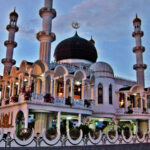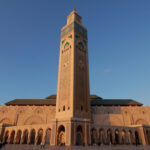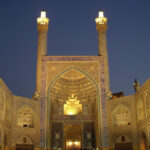*What Muslim Children Must Know Part 2*
.
Ebook
What Muslim Children Must Know
https://d1.islamhouse.com/data/en/ih_books/single3/en-what-muslim-children-must-know.pdf
.
*Questions 32: Mention some of the names and attributes-of Allah Almighty?*
*Answer: Allah, Ar-Rabb (the Lord), Ar-Rahman (the Most Compassionate),As-Sami’ (the All-Hearing), Al-Basir (the All-Seeing), Al-‘Alim (the All-Knowing), Ar-Razzaq (the-All-Provider), Al-Hayy (the Ever-Living), Al-“Azhim(the Magnificent) in addition to other-beautiful names and sublime-attributes.*
*Question 33: Explain these names?*
*Answer: Allah: It means the only-God worthy of worship with no partners.*
*Ar-Rabb: It means the only Creator,Owner, Provider, and Disposer of-Affairs.*
*As-Sami’: It means the One Whose-Hearing encompasses everything, and-Who hears all voices despite their differences and variations.*
*Al-Basir: It means the One Who-sees everything, no matter how small or-big itis.*
*Al-‘Alim: It means the One Whose-knowledge encompasses everything in-the past, present, and the future.*
*Ar-Rahman: It means the One-Whose mercy encompasses all creatures-and all living beings, i.e., all the servants and creatures-are under His-mercy.*
*Ar-Razzaq: It means the One Who-provides for all the creatures including-the humans, the jinn, and all other living beings.*
*Al-Hayy: It means the One Who-does not die while all creatures die.*
*Al-‘Azhim: It means the One Who-possesses all perfection and all-magnificence in His names, attributes, and deeds.*
*Question 34: What is our duty towards the Muslim-scholars?*
*Answer: Our duty towards the-Muslim scholars is to love them and refer-to them in-Sharia-related issues and-unprecedented events. We should-mention the scholars in a positive way, and whoever mentions them-negatively is not following the right path.*
*Allah Almighty says: (Allah will-raise in ranks those who believed-from among you and those who are given knowledge. And Allah is-All-Aware of what you do.) (Surat al-Mujadalah: 11)*
*Question 5: Who are the Awliya’ (allies) of AllahAlmighty?*
*Answer: They are the pious believers.*
*Allah Almighty says: (Indeed, the-allies of Allah will have no fear,nor will they grieve. Those who believe and fear Allah.) (Surat
Yunus: 62-63)*
*Question 36: Does Iman (faith) include words and-deeds?*
*Answer: Faith includes words,deeds, and beliefs.*
*Question 37: Does Iman increase and decrease?*
*Answer: Iman increases by-obeying Allah and decreases by disobeying-Him.*
*Allah Almighty says: (The true-believers are those whose hearts are-filled with awe when Allah is mentioned, and their faith increases-when His verses are recited to them, and they put their trust only-in their Lord.) (Surat al-Anfal: 2)*
*Question 38: What is Ihsan (benevolence/excellence)?*
*Answer: To worship Allah as if you see Him, and if you cannot seeHim,He sees you.*
*Question 39: When will the deeds be accepted by Allah-Almighty?*
*Answer: Deeds are accepted by Allah Almighty when two-conditions are-fulfilled, which are:*
*1. If the deed is dedicated with full sincerity to Allah Almighty*
*2. If the deed complies with the Sunnah of the Prophet (may Allah’s-peace and blessings be upon him)*
*Question 40: What is Tawakkul (reliance) on AllahAlmighty?*
*Answer: It means reliance on Allah-Almighty in bringing benefit and-warding off harm, while utilizing the available means.*
*Allah Almighty says: (Whoever puts his trust in Allah, He is sufficient-for him.) (Surat at-Talaq:3)*
*”Sufficient for him”: It means He will grant him sufficiency.*
*Question 41: What is the duty of enjoining good andforbidding evil?*
*Answer: Enjoining good: means-enjoining people to do every act of-obedience to Allah Almighty and forbidding evil means forbidding people-from every sin with which they disobey Allah Almighty.*
*Allah Almighty says: (You are the best nation ever raised for-mankind: you enjoin what is-right and forbid what is wrong and-believe in Allah.) (Surat Al 1mran: 110)*
*Question 42: Who are Ahl-us-Sunnah wa al-Jama’ah?*
*Answer: They are those people-who adopt the way of the Prophet (may-Allah’s peace and blessings be upon him) and his Companions in words,deeds, and beliefs.*
*They are called “Ahl-us-Sunnah”-because they follow the Sunnah of theProphet (may Allah’s peace and blessings-be upon him) and refrain from-introducing innovations in the religion(bid’ah)*
*”Al-Jama’ah” (group) refers to the fact that they have united on the truth-and were not divided therein.*
*The Fiqh Section*
*Question 1: Define Taharah (ritual purification)?*
*Answer: Taharah means-purification from Hadath (ritual impurity) and-Khabath (material impurity).*
*Purification from “khabath” is by-removing material impurity from one’s-body, clothes, or place of prayer.*
*Purification from “hadath” is by-performing ablution or Ghusl (ritual bath)with pure water, or by performing Tayammum (dry ablution) in case the-water is unavailable or it is difficult for one to use it.*
*Question 2: How could one purify what is affected by-Najasah (material impurity)?*
*Answer: By washing it with water until it becomes clean.*
*As for what is licked by a dog, it-has to be washed seven times the first of-which must be with dust.*
*Question 3: What is the merit of ablution?*
*Answer: The Prophet (may Allah’s-peace and blessings be upon him) said:”When a Muslim – or a believer – performs ablution and washes his face,every single sin that he committed with his-eyes will be washed away from-his face with water, or with the last drop of water. When he washes his-hands, every single sin that he committed with his hands will be washed-away from his hands with water, or with the last drop of water. When he-washes his feet, every single sin that he-committed with his feet will be-washed away from his feet with the water, or with the last drop of water,until he finally becomes purified from all his-sins.” (Narrated by Muslim)*
*Question 4: How should we perform ablution?*
*Answer: We perform ablution by: -Washing the hands – three times*
*- Rinsing the mouth three times, and sniffing water into the nose and-blowing it out of the nose – three times*
*Madmadah: It means rinsing the-mouth with water then spitting it out.*
*Istinshaq: It means sniffing water-into the nose with the right hand.*
*Istinthar: It means blowing water out of the nose with the left hand.*
*- Washing the face – three times*
*- Washing the arms including the-elbows – three times*
*- Wiping over the head, moving the-hands forwards then backwards, and-wiping the ears*
*- Washing the feet up to the ankles- three times*
*This is the most perfect manner of-performing ablution as authentically-reported from the Prophet (may Allah’s peace and blessings be upon him)in the Hadiths of Al-Bukhari and Muslim-that were narrated by “Uthman,“Abdullah ibn Zayd, and others. It was also authentically reported from the-Prophet (may Allah’s peace and blessings be-upon him) in Sahih al-Bukhari-and others that he washed each of the organs of ablution once and-sometimes twice.*
*Question 5: What are the obligatory acts of ablution?
How many are they?*
*Answer: The obligatory acts of ablution are the acts that render one’s-ablution invalid if one of them is left out. They are:*
*1. Washing the face, which includes rinsing the mouth and sniffing water-into the nose*
*2. Washing the arms including the elbows*
*3. Wiping over the head, which includes wiping the ears*
*4. Washing the feet up to the ankles*
*5. Maintaining the prescribed order by washing the face first, followed by-the hands, then wiping over the head, and finally washing the feet.*
*6. Succession, which means washing the organs of ablution successively-without leaving an interval of time that allows the organs to become dry.*
*An example in this regard is when one performs only half of the ablution-and then completes it some other time. In this case, one’s ablution is-invalid.*
*Question 6: What are the Sunan (recommended acts) of-ablution? How many are they?*
*Answer: The recommended acts of-ablution are those acts which if-performed, one’s reward increases, and if one does not perform them, he-incurs no sin, and his ablution is valid. They are:*
*1. Saying: “Bismillah” (In the Name of Allah))*
*2. Using the Siwak (tooth-cleaning twig)*
*3. Washing the two palms*
*4. Washing between the fingers*
*5. Washing the organs for a second and third time*
*6. Starting with the right organs first*
*7. Saying the following Dhikr after ablution: “Ash-hadu alla ilaha illallah-wahdahu la sharika lah, wa ash-hadu anna Muhammad ‘abduhu wa-rasuluh” (I testify that there is no god but Allah with no partners with Him,and I testify that Muhammad is His servant and messenger)*
*8. Performing two Rak’ahs (units of prayer) after ablution*
*Question 7: What are the invalidators of ablution?*
Answer: The invalidators of ablution are:
*1. Whatever comes out of the-two private parts, i.e., urine, feces, or wind*
*2. Sleep, madness, or loss of consciousness*
*3. Eating camel meat*
*4. Touching the front or back private parts with hand without a barrier*
*QUESTION 8: What is Tayammum (dry ablution)?*
*Answer: Tayammum: It means-using dust or the like of earth when water-is unavailable, or it cannot be used.*
*Question 9: How do we perform Tayammum?*
*Answer: We perform Tayammum-by striking the dust once with the-palms of the hands and wiping the face and the back parts of the hands-once only.*
*Question 10: What are the-invalidators of Tayammum?*
*Answer: All the invalidators of ablution,also when water is available.*
*Question 11: What are the Khuffs and Jawrabs? Is it-permissible to wipe over them in ablution?*
*Answer: The Khuffs refer to the leather socks that one may put on his-feet.*
*The Jawrabs, on the other hand,refer to socks that are made of other-than leather.*
*It is permissible to wipe over them-in ablution instead of washing the-feet.*
*Question 12: What is the wisdom behind wiping over-leather socks?*
*Answer: It is meant to make things-easy for people and alleviate the-hardship of performing ablution, especially in cold weather during winter,and while traveling when it is hard for one to take off the socks.*
*Question 13: What are the conditions of the validity of-wiping over leather socks?*
Answer:
*1. To put on the leather socks while being in a state of Taharah(ritual purification), i.e., after performing ablution.*
*2. The leather socks must be pure, since it is impermissible to wipe over-what is impure.*
*3. The leather socks must cover the whole feet including ankles.*
*4. Wiping over leather socks must be within the limited period of time,which is a day and a night for a resident, and three days and three nights-for a traveler.*
*Question 14: What is the manner of wiping over leather-socks?*
*Answer: It is by putting one’s wet-fingers over his toes and wiping over-them up to the shin, using the right hand to wipe over the right feet and-the left hand to wipe over the left feet. The fingers should be kept apart-during the wiping, and it should be done once without being repeated.*
*Question 15: What invalidates wiping over leather-socks?*
Answer:
*1. Expiry of the specific-duration of time for wiping, since it is-impermissible to wipe over them after that duration: a day and a night for-a resident, and three days and three nights for a traveler.*
*2. Taking off the leather socks or-one of them after wiping.*
*Question 16: What is the meaning of Salah (prayer)?*
*Answer: Salah is worshiping Allah-by specific words and acts. It starts with-Takbir (saying: Allahu Akbar i.e., Allah is the Greatest) and ends with-Taslim (salutation of peace that ends the prayer).*
*Question 17: What is the ruling of prayer?*
*Answer: Prayer is an obligation-upon every Muslim.Allah Almighty says: (Indeed, prayer is prescribed for the believers-at specific times.)* (Surat an-Nisa’: 103)
*Question 18: What is the ruling on abandoning the-prayer?*
*Answer: Abandoning the prayer constitutes disbelief, as the Prophet(may Allah’s peace and blessings be upon him) said: “The covenant (that-distinguishes) between us and them(disbelievers) is the prayer, so,whoever abandons it has indeed committed disbelief.” (Narrated byAhmad, At-Tirmidhi, and others)*
*Question 19: How many prayers are obligatory upon the-Muslim in one day and night? What are the-number of Rak’ahs in each prayer?*
*Answer: There are five obligatory-prayers in one day and night. They are-the Fajr (dawn) prayer: two Rak’ahs, the Zhuhr (noon) prayer: four-Rak’ahs, the ‘Asr (afternoon) prayer: four-Rak’ahs, the Maghrib (sunset)prayer: three Rak’ahs, and the ‘Isha’ (night) prayer: four Rak’ahs.*
*Question 20: What are the conditions of prayer?*
Answer:
*1. Islam, as the prayer of a disbeliever is invalid*
*2. Sanity, as the prayer of an insane person is invalid*
*3. Discernment, as the prayer of the undiscerning child is invalid*
*4. The intention*
*5. Commencement of the prescribed time*
*6. Taharah, i.e., removal of Hadath (ritual impurity)*
*7. Purification from physical impurity*
*8. Covering the ‘Awrah (parts of the body that must be covered)*
*9. Facing the Qiblah (direction of the Ka’bah)*
*Question 21: What are the pillars of the prayer?*
*Answer: They are fourteen pillars,which are:*
*1. Standing in the obligatory prayer for the one who is capable*
*2. The opening Takbir, which is saying: “Allahu Akbar” (Allah is the-Greatest)*
*3. Reciting Surat al-Fatihah*
*4. Ruku’ (bowing) while straightening one’s back and making his head in-alignment with his back*
*5. Rising from Ruku’*
*6. Standing up straight*
*7. Sujud (prostration): It is by placing one’s forehead, nose, palms, knees,and tiptoes on the ground while prostrating*
*8. Rising from Sujud*
*9. Sitting between the two prostrations*
*It is an act of Sunnah to sit on one’s left foot, while keeping the right foot-straight upward and-keeping its toes facing the Qiblah.*
*10. Serenity, which is calmness in-performing each physical pillar*
*11. The last Tashahhud*
*12. Sitting for Tashahhud*
*13. Making Taslim by saying: “As-salamu ‘alaykum wa rahmatullah” (may-the peace and mercy of Allah be upon you) -twice.*
*14. Maintaining the prescribed order of the pillars as mentioned: so, if-one intentionally prostrates before bowing, his prayer is invalid. However,if he does so unintentionally, he must return back to perform bowing first-then prostrate.*
*QUESTION 22: What are the obligatory acts of the prayer?*
*Answer: The obligatory acts of the prayer are eight: they are:*
*1. Making Takbirs (saying: Allahu Akbar), other than the opening Takbir*
*2. Saying: “Sami’allahu liman-hamidah” (Allah hears whoever praises Him)by the Imam and the one praying alone*
*3. Saying: “Rabbana wa laka-al-hamd” (O our Lord, all praise belongs to-You)*
*4. Saying: “Subhana rabbiya-Al-‘Azhim” (Glory be to my Lord, the-Magnificent) once in Ruku’ (bowing)*
*5. Saying: “Subhana rabbiya-Al-A’la” (Glory be to my Lord, the Highest)once in Sujud (prostration)*
*6. Saying: “Rabbighfirli” (O Lord,forgive me) between the two-prostrations*
*7. Saying the first Tashahhud*
*8. Sitting for the first Tashahhud*
*QUESTION 23: What are the Sunan (recommended acts) of-the prayer?*
*Answer: They are eleven, which are:*
*1. Reciting Du’a’ al-Istiftah (the opening supplication), after making the-opening Takbir, by saying: “Subhanak Allahumma wa bihamdik, wa-tabarak ismuk, wa ta’ala jadduk, wa Ia ilaha ghayruk” (Glory be to You, O-Allah,and with Your praise, and blessed is Your Name, and exalted is Your-majesty, and there is no god but You)*
*2. Making Ta’awwudh (saying:A’udhu billah min ash-shaytan ar-rajim) (I-seek refuge with Allah from the accursed devil)*
*3. Saying: “Bismillah ar-Rahman-ar-Rahim” (In the Name of Allah, theMost Compassionate, the Most Merciful)*
*4. Saying: “Amin” (Amen)*
*5. Reciting a surah after Surat al-Fatihah*
*6. Reciting the Qur’an audibly by the Imam*
*7. Saying after Tahmid (praising Allah): “Mil’as-samawati wa mil’al-ardi-wa mil’a ma shi’ta min shay’in ba’d” (filling the heavens, the earth, and-whatever else You will)*
*8. The Tasbihs (Glorifying Allah)after the first Tasbih in Ruku’, i.e., the-second and third Tasbihs or more*
*9. The Tasbihs (Glorifying Allah)after the first Tasbih in Sujud*
*10. Saying more than once:”Rabbighfirli” between the two prostrations*
*11. Invoking the peace and blessings of Allah upon the Prophet and hisfamily in the last Tashahhud and making supplication thereafter*
*Fourth: The physical Sunan (recommended acts) of the prayer, which are-called “postures”, are:*
*1. Raising both hands with the opening Takbir*
*2. Raising both hands when performing Ruku’*
*3. Raising both hands when rising from Ruku'”*
*4. Lowering the hands after that*
*5. Placing the right hand over the left one*
*6. Looking at one’s place of prostration*
*7. Leaving a gap between the feet while standing*
*8. Gripping the knees with both hands with the fingers spread out in-Ruku’, while straightening one’s-back, and making one’s head in alignment-with one’s back*
*9. Resting the organs of-prostration on the ground, while making sure-that all of them touch the ground.*
*10. Keeping the arms away from-the sides, the abdomen away from the-thighs, and the thighs away from the legs: keeping the knees apart and-keeping the feet erected with the toes separated and their bottom-touching the ground: putting the hands in alignment with the shoulders-while being spread out and with the fingers joined.*
*11. Engaging in Iftirash (to place the left foot on its side and sitting on it:and keeping the right foot erected while resting on the bottom of the toes-facing them towards the Qiblah) while sitting between the two-prostrations and during the first Tashahhud. However, performing-Tawarruk (to sit with the left posterior on the ground: the right foot-erected with the toes pointing towards the Oiblah: and the left foot on its-side emerging from under the right foot) during the second Tashahhud.*
*12. Putting the hands spread out-on the thighs with the fingers joined-between the two prostrations and during the-Tashahhud as well: however,in-the latter, one may clench the little and ring fingers of the right hand,making a ring with the thumb and middle fingers, and pointing with the-index finger when mentioning Allah.*
*13. Turning the face to the right-and then to the left when making Taslim*
Question 24: What are the invalidators of the prayer?
Answer:
1. Leaving out one of the pillars or conditions of the prayer
2. Talking deliberately
3. Eating or drinking
4. Freguent and successive movements
5. Leaving out one of the obligatory acts of the prayer deliberately
Question 25: How should a Muslim perform the prayer?
Answer: The manner of the prayer-is as follows:
1. Face the Qiblah with one’s whole-body, without deviating or turning-away from that direction
2. Make the intention, in one’s-heart without uttering it, to perform a-specific prayer
3. Make the opening Takbir by-saying: “Allahu Akbar” (Allah is the-Greatest), while raising the hands to be in alignment with the shoulders
4. Place the right palm on top of the left hand above the chest
5. Recite the opening supplication-by saying: “Allahumma ba’id bayni wa-bayna khatayay kama ba’dta bayna al-mashrig wa al-maghrib, Allahumma-naqqini min khatayay kama yunaqqa ath-thawb al-abyad min ad-danas,Allahumma ighsilni min khatayay bil ma’i wa ath-thalji wa al-barad” (O-Allah, separate me from my sins as You have-separated the East from the-West. O Allah, cleanse me of-my sins as the white garment is cleansed of-stains. O Allah, wash away my sins with ice, water, and hail).
Or by saying: “Subhanak Allahumma wa bihamdika, wa tabarak ismuka,wa ta’ala jadduka, wa Ia ilaha ghayruk” (Glory be to You, O Allah, and with-Your praise, and blessed is Your Name, and exalted is Your majesty, and-there is no god but You)
6. Seek refuge with Allah by-saying: “A’udhu billah min ash-shaytan ar-rajim” (I seek refuge with Allah from the accursed devil)
7. Say Bismillah and recite Surat-al-Fatihah by saying: “In the name of-Allah, the Most Compassionate, the Most Merciful! All praise be to-Allah, the Lord of the worlds, the Most-Compassionate, the Most-Merciful, Master of the Day of Judgment. You alone we worship,and You alone we ask for help. Guide us to the straight path, the-path of those whom You have blessed: not of those who incurred-Your Wrath, or of those who went astray.) (Surat al-Fatihah: 1-7)
Then, one says: “Amin”, which-means: O Allah, answer the supplication.
8. Recite the Qur’an as much as is-easy, and prolong the recitation in the-morning prayer
9. Bow, which means bending-one’s back to glorify Allah: and making-Takbir when bowing, while raising the hands to be in alignment with the-shoulders. It is a Sunnah to extend one’s back and make the head on the-same line with the back, while placing the hands, with the fingers kept-apart, on one’s knees.
10. Say the following in Ruku””Subhana rabbiya Al-‘Azhim” (Glory be to-my Lord, the Magnificent) – three times. If one adds to that: “Subhanak-Allahumma wa-bihamdik, Allahumma ighfirIi” (Glory be to You, O Allah,and with Your praise. O Allah, forgive me), that will be good.
11. Raise your head from Ruku’-while saying: “Sami’allahu liman-hamidah” (Allah hears whoever praises Him), then raise your hands up to-the shoulders. The one praying behind the Imam does not say:”Sami’allahu liman hamidah”: rather, one should say: “Rabbana wa laka al-hamd” (O our Lord, praise be to You).
12. After rising from Ruku’, one-says: “Rabbana wa laka al-hamd mil’a as-samawati wa mil’a al-ardi wa mil’a ma shi’ta min shay’in ba’d” (O our Lord,praise be-to You as much as would fill the heavens and the earth, and as-much as would fill whatever You will after that).
13. Make the first prostration while-saying: “Allahu Akbar” (Allah is the-Greatest) and prostrate on seven parts of the body: the forehead, the-nose, the palms, the knees, and the tiptoes: keeping the arms away from-the sides and not spreading out the arms on the ground and facing the-Qiblah with the tiptoes.
14. Say in the prostration: “Subhana rabbiya Al-A’la” (Glory be to my-Lord, the Highest) – three times. If one adds to that: “Subhanak Allahumma-wa bihamdik, Allahumma ighfir Ii” (Glory be to You, O Allah, and with Your-praise. O Allah, forgive me), that will be good.
15. Raise the head from prostration while saying: “Allahu Akbar” (Allah is-the Greatest).
16. Sit between the two prostrations on the left foot, with the right foot-erect, putting the right hand on the edge of the thigh, just above the knee,while clenching the little and ring fingers and raising the index finger and
moving it when making supplication: joining the tip of the thumb with the-tip of the middle finger to make a ring: putting the left hand, with the-fingers spread out, on the edge of the thigh, just above the knee.
17. Say the following while sitting between the two prostrations: “Rabbighfir li warhamni wahdini warzuqni wajburni wa ‘afini” (O Lord, forgive-me, have mercy on me, guide me, provide for me, improve my situation,and grant me safety).
18. Perform the second prostration-in the same manner as the first one in-terms of what is to be said and done: make Takbir at the moment of-prostrating.
19. Rise from the second prostration while saying: “Allahu Akbar” (Allah is-the Greatest) and perform the second Rak’ah (unit of prayer) like the first-one, but without reciting the opening supplication.
20. Sit after the second Rak’ah while saying: “Allahu Akbar” in the same-manner of sitting between the two prostrations.
21. Recite Tashahhugd, in this sitting posture, saying: “At-tahiyyatu lillahi-wa as-salawatu wa at-tayyibat, as-salamu ‘alayka ayyuha an-nabiyy wa-ash-hadu alla ilaha illallah wa ash-hadu anna Muhammad ‘abduhu wa-rasuluh. Allahumma salli “ala Muhammad wa ‘ala ali Muhammad kama-sallayta ‘ala Ibrahim wa ‘ala ali Ibrahim innaka hamidun majid, wa barik’ala Muhammad wa ‘ala ali Muhammad kama barakta ‘ala Ibrahim wa ‘ala-ali Ibrahim innaka hamidun majid, a’udhu billahi min “adhabi jahannam wa-min “adhabi al-gabr wa min fitnat al-mahya wa al-mamat wa min fitnat al-masih ad-dajjal” (All compliments,prayers and pure words are due toAllah. Peace be upon you, O Prophet, and the mercy of Allah and His blessings. Peace be upon us and upon the righteous slaves of Allah. I bear-witness that there is no god except Allah, and I bear witness that-Muhammad is His slave and messenger. O Allah, send prayers upon-Muhammad and upon the family of Muhammad, as You sent prayers upon-Abraham and the family of Abraham, You are indeed Praiseworthy, Most-Glorious. O Allah, bless Muhammad and the family of Muhammad as You blessed Abraham and the family of Abraham, You are indeed Praiseworthy, Most Glorious. I seek refuge in Allah from the torment of-Hellfire, from the torment of the grave, from the trial of life and death,and from the trial of the Antichrist). Then, one may supplicate Allah asking-for whatever he wishes of the good of this life and the Hereafter.
22. Make Taslim on the right, saying: “As-salamu ‘alaykum wa
rahmatullah” (May the peace and mercy of Allah be upon you), then make-Taslim on the left.
23. In case it is a three-Rak’ah or-four-Rak’ah prayer, then the first-Tashahhud should stop at the point of saying: “Ash-hadu alla ilaha illallah-wa ash-hadu anna Muhammad ‘abduhu wa rasuluh” (I testify that there is-no god but Allah, and I bear witness that Muhammad is His slave and-messenger).
24. Stand up while saying: “Allahu-Akbar” and raise the hands to be in-alignment with the shoulders.
25. Perform the rest of the prayer-in the same manner of the second-Rak’ah, except that Surat-al-Fatihah should only be recited.
26. Sit in the Tawarruk position,keeping the right foot erect, extending-the left foot from underneath the right leg, resting the posterior on the-ground, and putting the hands on the thighs in the same manner as in the-first Tashahhud.
27. Recite the whole Tashahhud-while sitting in this position.
28. Make Taslim to the right,saying: “As-salamu ‘alaykum wa-rahmatullah” (May the peace and mercy of Allah be upon you), then make-Taslim to the left.
Question 26: What Adhkar (regular supplications)should be recited after making Taslim and-ending the prayer?
Answer: – “Astaghfirullah” (I ask Allah for forgiveness) – three times.
– “Allahumma anta as-salam wa-minka as-salam tabarakta ya dhal-jalal wa-al-ikram” (O Allah, You are the Source of Peace and all peace comes from-You, blessed are You, O Possessor of majesty and honor).
– “La ilaha illallah wahdahu Ia sharika lah, lahu al-mulku wa lahu al-hamduwa huwa ‘ala kulli shay’in qadir, Allahumma la mani’a lima a’tayt wa Ia-mu’ti lima mana’t wa la yanfa’u dhal-jaddi minka al-jadd (There is no god-but Allah alone with no partners. To Him belong the sovereignty and-praise, and He is Omnipotent over all things. O Allah, none can withhold-what You have given, and none can give what You have withheld. No-wealth or fortune can benefit anyone, as all wealth and fortune come-from You).
– “La ilaha illallah wahdahu Ia sharika lah, lahu al-mulku wa lahu al-hamdu-wa huwa ‘ala kulli- shay’in qadir, la hawla wa la quwwata illa billah, Ia ilaha
illallah wa la na’budu illa iyyah, lahu an-ni’matu wa lahu al-fadl wa lahu-ath-thana’ al-hasan, Ia ilaha illallah mukhlisin lahu ad-din wa law kariha al-kafirun” (There is no god but Allah alone, with no partner. To Him belongs-the sovereignty and to Him belongs the praise, and He is Omnipotent over-all things. There is no power and no strength except with Allah, there is no-god, but Allah and we worship none but Him. From Him (alone) come all-blessings and favors, and all good praise is due to Him. There is no god,but Allah and we make our worship purely for Him (alone) even if the-disbelievers hate that).
– “Subhanallah” (Glory be to Allah) – thirty-three times.
“Alhamdulillah” (praise be to Allah) – thirty-three times.
“Allahu Akbar” (Allah is the Greatest) – thirty-three times.
Then, to complete one hundred, say: “La ilaha illallah wahdahu Ia sharikalah, lahu al-mulku wa lahu al-hamdu wa huwa ‘ala kulli shay’in qadir”(There is no god but Allah alone, with no partner. To Him belongs the-sovereignty and to Him belongs the praise, and He is Omnipotent over all-things).
– Reciting Surat al-Ikhlas and Al-Mu’awwidhat (Surat al-Falaq and Surat-an-Nas) three times after the Fajr and Maghrib prayers, and once after the-other prayers.
– Reciting Ayat al-Kursi (verse no. 255 of Surat al-Baqarah) once.
Question 27: What are the regular Sunnah prayers?What is their merit?
Answer:
– Two Rak’ahs before Fajr
– Four Rak’ahs before Zhuhr
– Two Rak’ahs after Zhuhr
– Two Rak’ahs after Maghrib
– Two Rak’ahs after ‘Isha’
Regarding their merit, the Prophet (may Allah’s peace and blessings be-upon him) said: “Allah builds a house in Paradise for whoever prays twelve-voluntary Rak“ahs in one day and night.” (Narrated by Muslim, Ahmad,and others)
Question 28: What is the best day of the week?
Answer: The best day of the week-is Friday, as the Prophet (may Allah’s-peace and blessings be upon him) said: “Friday is among the best of your-days. It is the day Adam was created and the day he died. It is the day on-which the Trumpet will be blown and the-Screak will be made, so, send-more blessings on me on that day, for your blessings will be presented-before me.”
They said: “O Messenger of Allah, how can it be that our blessings will be-presented to you while your body is decayed”” He replied: “Allah Almighty-has prohibited the earth from consuming the bodies of the prophets.”(Narrated by Abu Dawud and others)
Question 29: What is the ruling on the Jumu’ah (Friday)prayer?
Answer: It is an individual duty on every male, adult, sane, and resident-Muslim.
Allah Almighty says: (O you who-believe, do not let your wealth and-your children distract you from Allah’s remembrance. For whoever-does that, it is they who are the losers.)
(Surat al-Munafiqun: 9)
Question 30: What is the number of Rak’ahs in the-Jumu’ah prayer?
Answer: The Jumu’ah prayer consists of two Rak’ahs in which the Imam-recites the Qur’anic verses audibly, and which are preceded with two-Khutbahs (sermons).
Question 31: Is it permissible not to attend the Jumu’ah-prayer?
Answer: Not attending the Jumu’ah-prayer is impermissible, except for a-Sharia-approved excuse. The Prophet (may Allah’s peace and blessings be-upon him) said: “Whoever misses three Friday prayers out of negligence,Allah places a seal upon his heart.” (Narrated by Abu Dawud and others)
Question 32: Mention the Sunnah acts to be performed-on Friday?
Answer:
1. Taking a shower
2. Putting on perfume
3. Wearing the best of clothes
4. Going early to the mosgue
5. Invoking blessings upon the Prophet freguently
6. Reciting Surat al-Kahf
7. Walking to the mosgue
8. Seeking the hour in which supplication is most likely to be answered
Question 33: What is the merit of the congregational-prayer?
Answer: “Abdullah ibn “Umar (may-Allah be pleased with him and his-father) reported that the Prophet (may Allah’s peace and blessings be-upon him) said: “Praying in congregation is twenty-seven times better than-praying alone.” (Narrated by Muslim)
Question 34: What is Khushu’ (humility) in prayer?
Answer: It means the attendance-of the heart and the serenity of the-body while performing the prayer.
Allah Almighty says: (The-believers have attained true success:those who humble themselves in their prayers.) (Surat al-Mu’minin:1-2)
Visits: 0



























